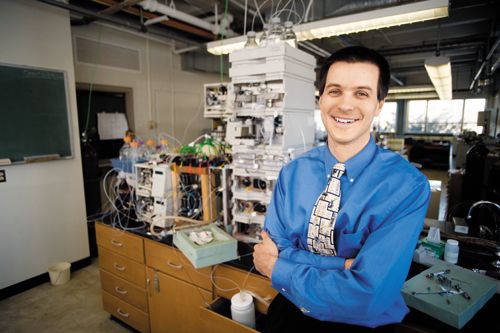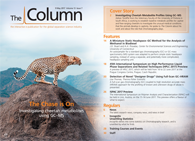Stoll Receives Agilent Thought Leader Award
Agilent Technologies has awarded Dwight Stoll an Agilent Thought Leader Award in support of his research applying two‑dimensional liquid chromatography (2D‑LC) to biopharmaceutical analysis.

Agilent Technologies has awarded Dwight Stoll an Agilent Thought Leader Award in support of his research applying twoâdimensional liquid chromatography (2DâLC) to biopharmaceutical analysis.
“I am honoured to receive this award and very excited about Agilent’s support of the vision of my laboratory and our collaborators,” said Stoll, associate professor of analytical chemistry, Gustavus Adolphus College, Minnesota, USA, and future LCGC “LC Troubleshooting” columnist.
Stoll will lead a project on the use of 2D-LC in biopharmaceutical analysis that includes several international experts, including Michael Lämmerhofer, Douglas Richardson, and Davy Guillarme.
“We are pleased to support Dr. Stoll’s research,” said Stefan Schuette, vice president and general manager, Liquid Phase Separations Division, Agilent Technologies. “The collaborative nature of the research of Dr. Stoll and his international colleagues, combining both academia and industry, will undoubtedly accelerate the progress of these types of solutions for the biopharma industry.”
The Agilent Technologies Thought Leader Award promotes fundamental scientific advances by contributing financial support, products, and expertise to the research of influential thought leaders in the life sciences, diagnostics, and applied chemical markets.
If you would like to read more from Dwight Stoll he published his first “LC Troubleshooting” column in our February 2017 issue (1). Stoll will take over the column permanently in October 2017 from the retiring John Dolan.
Reference
- D.R. Stoll, LCGC Europe30(2), 80–83 (2017).

Analysis of PFAS in Milk by LC-MS/MS
May 15th 2025Dairy milk is one commodity that can be impacted by environmental contaminants, such as PFAS, so it is important to implement extensive, robust, and accurate testing. In this work, a sensitive and reliable method was developed for the analysis of PFAS in milk by LC-MS/MS at levels as low as 0.01 µg/kg.

.png&w=3840&q=75)

.png&w=3840&q=75)



.png&w=3840&q=75)



.png&w=3840&q=75)












